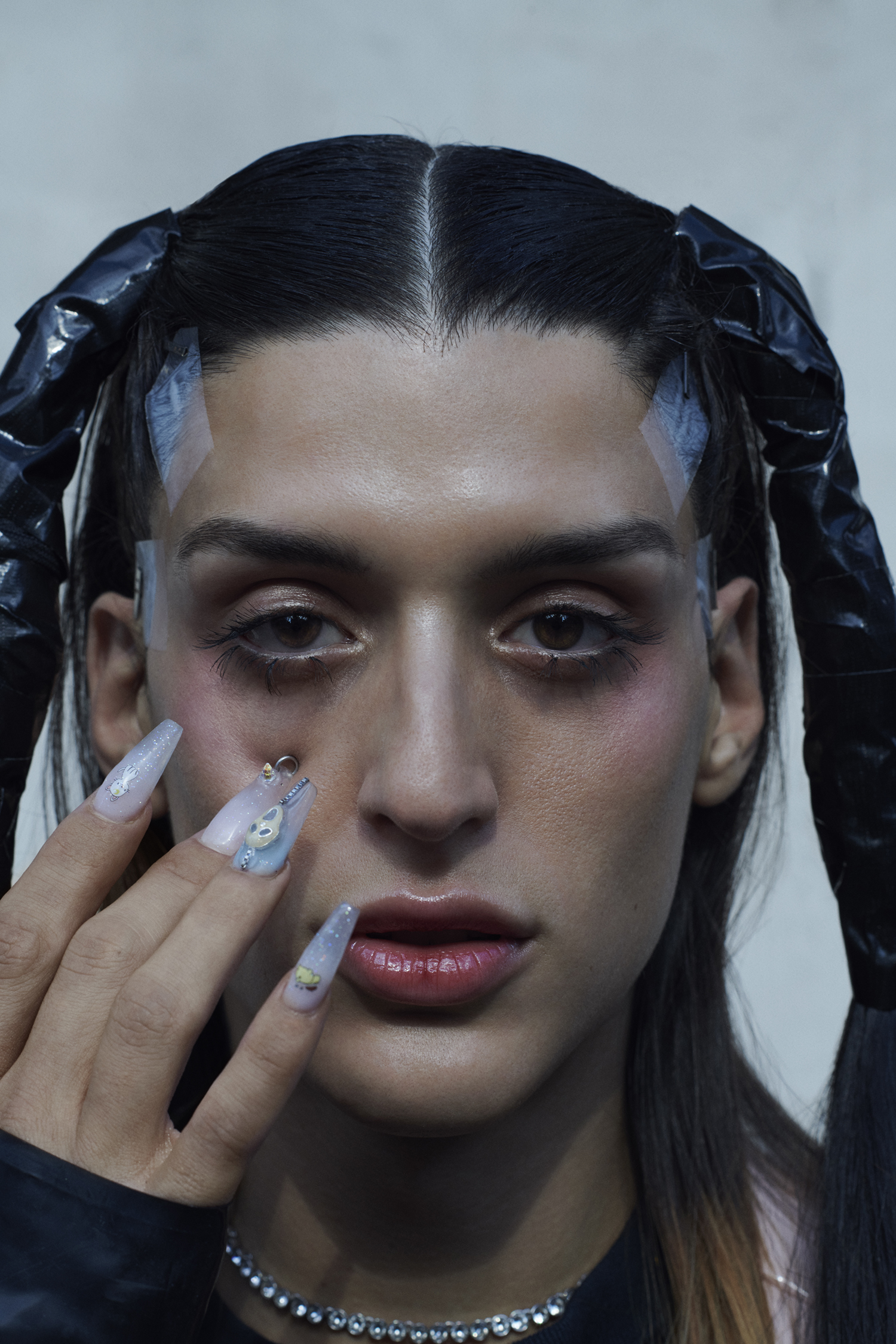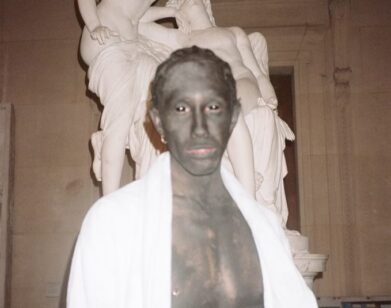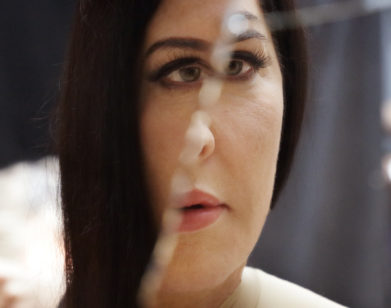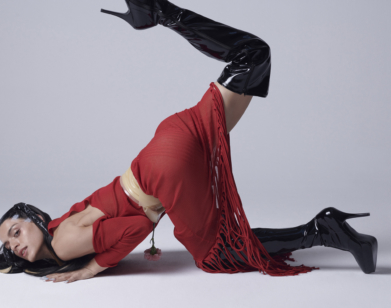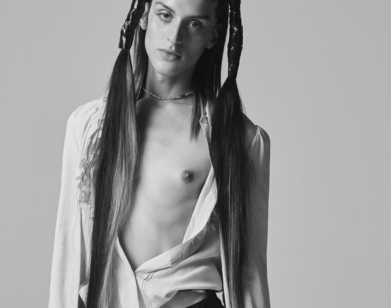arca arca arca
Arca and Marina Abramović on Divas, Death, and Body Drama
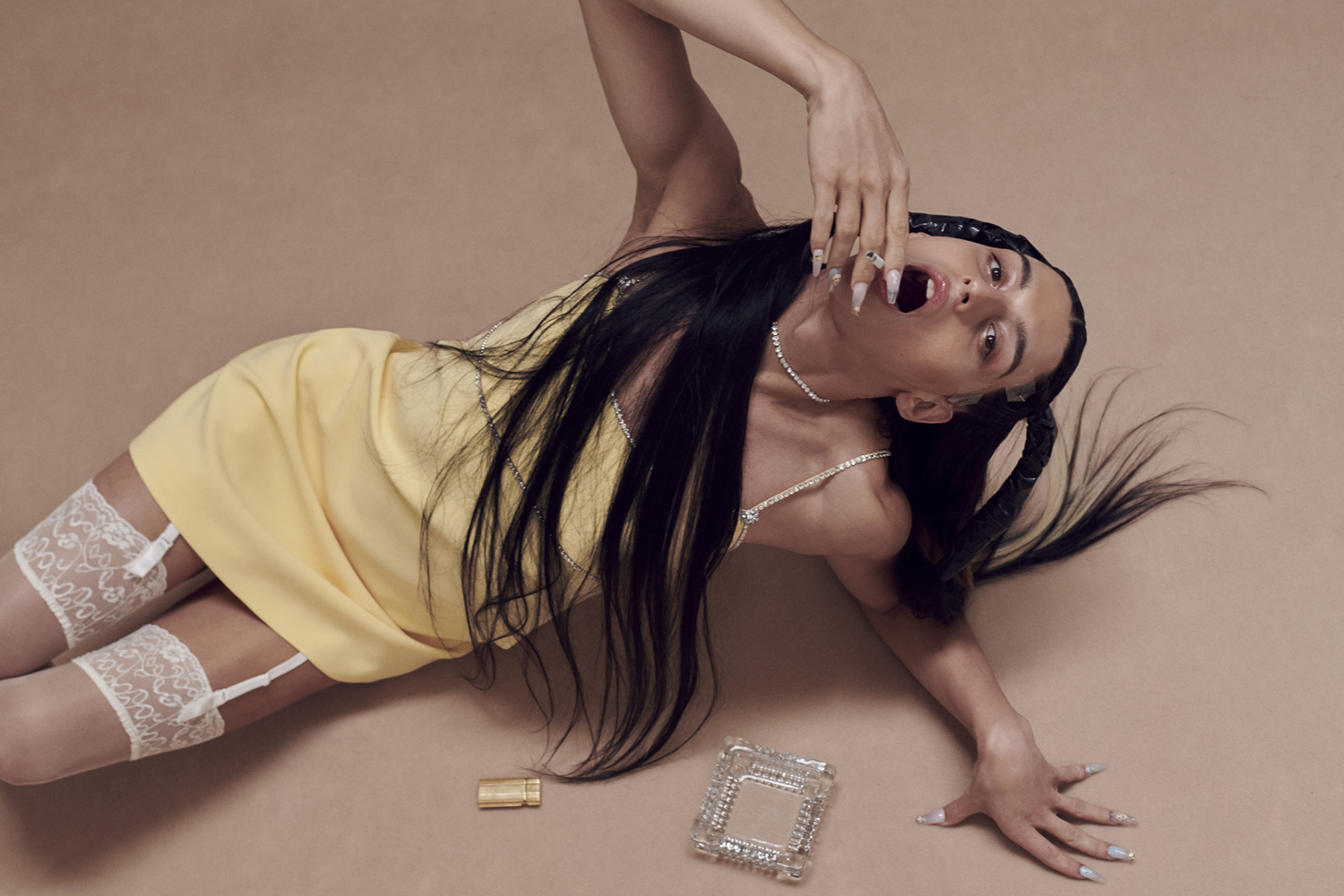
Dress by Miu Miu via Brownsfashion.com. Necklace (worn throughout) Arca’s Own. Garters and Stockings by Agent Provocateur.
As with most great avant artists, it’s easier to describe how Arca makes you feel than what it is, exactly, she makes. In her work as a record producer, DJ, singer, and songwriter, the nonbinary Latinx transwoman transmits such a heady confluence of ideas about love and pop and machines and mortality that they are as likely to result in orgasm as they are anxiety. The Barcelona-based performer, who was born in Venezuela and whose name is Alejandra Ghersi, makes live shows that taste like metal, videos that feel like the release of chaos, and songs that smell like the deepest, dankest parts of the earth. Arca has come out with four studio albums, including this summer’s KiCk i, her most accessible offering to date, which featured appearances by Björk, Rosalía, and Sophie. Conceived as a tetralogy, Arca is set to unleash three more installments of KiCk into the universe, which is why we’ve split this piece into three distinct conversations, with the artist Marina Abramović, the musician Rosalia, and the actor Oscar Isaac. This is part I: Body.
———
MARINA ABRAMOVIĆ: Arca, are you happy?
ARCA: No, but I’m chasing it.
ABRAMOVIĆ: What is true happiness to you?
ARCA: I think of happiness as a state rather than a destination, and I find myself slipping in and out of it. Sometimes I’m frustrated when I slip out of it, but I guess its impermanence is part of what keeps me wanting to slip back in, to create the conditions so that the sensation may emerge inside rather than forcing it.
ABRAMOVIĆ: It’s so interesting to me to think about how happiness and unhappiness are actually related to love, because we are always so happy in love. You can have love with a bird in a cage, love with a dog, love with family. But the bird flies away, the dog runs away, the lover leaves, the parents die. You can’t grasp it.
ARCA: I was allergic to cats growing up, but I was fascinated by them. This year, a cat appeared in my life. I thought it was a stray, and began to develop an attachment to it. Slowly, I would let the cat farther and farther into my home. By the end of it, I was like, “This is my baby.” Then one day, she just disappeared. I asked everyone around the block if they’d seen her. Apparently, she had an owner.
ABRAMOVIĆ: Oh my.
ARCA: I was devastated. I knew that if the cat was there, the cat wanted to be there, because she had found a way to come in and out through the courtyard. I never forced her to stay. I think about love and attachment in the same way. If you never possess someone, if they’re never really yours, then you know that when they’re there, they want to be there.
ABRAMOVIĆ: There is a wonderful story of a Sufi master. A king sent him the most exquisite three vases. He looked at them, at their shapes, their colors, and the texture and thinness of the glass. He adored them. Then, after about 15 minutes of looking at them, he broke them one by one. His students were in total shock. They said, “Master, why did you do this?” And he said, “It’s much better to do it now than later when I get attached.” It’s important that we see suffering, attachment, and love as something that comes and goes. It’s like the weather. Today is sunny and tomorrow it will rain, but it will be sunny again. It takes a lifetime to learn this.
ARCA: If you’re able to swap roles between the dominant one and the submissive one, maybe with a safe word, then you can probably go much longer without having to reach a conclusion. That’s one thing I really love about gay sex, this idea of penetrating one another. It doesn’t even have to do with genitals. Psychologically, when there’s a master and a sub, it’s really hard to imagine yourself in the other person’s position, but if you can do that psycho-emotionally with someone, that can open up new possibilities.
ABRAMOVIĆ: That’s true, but we can also do this with ourselves. We have in ourselves the strong one and the weak one, the one who is crying and complaining all the time.
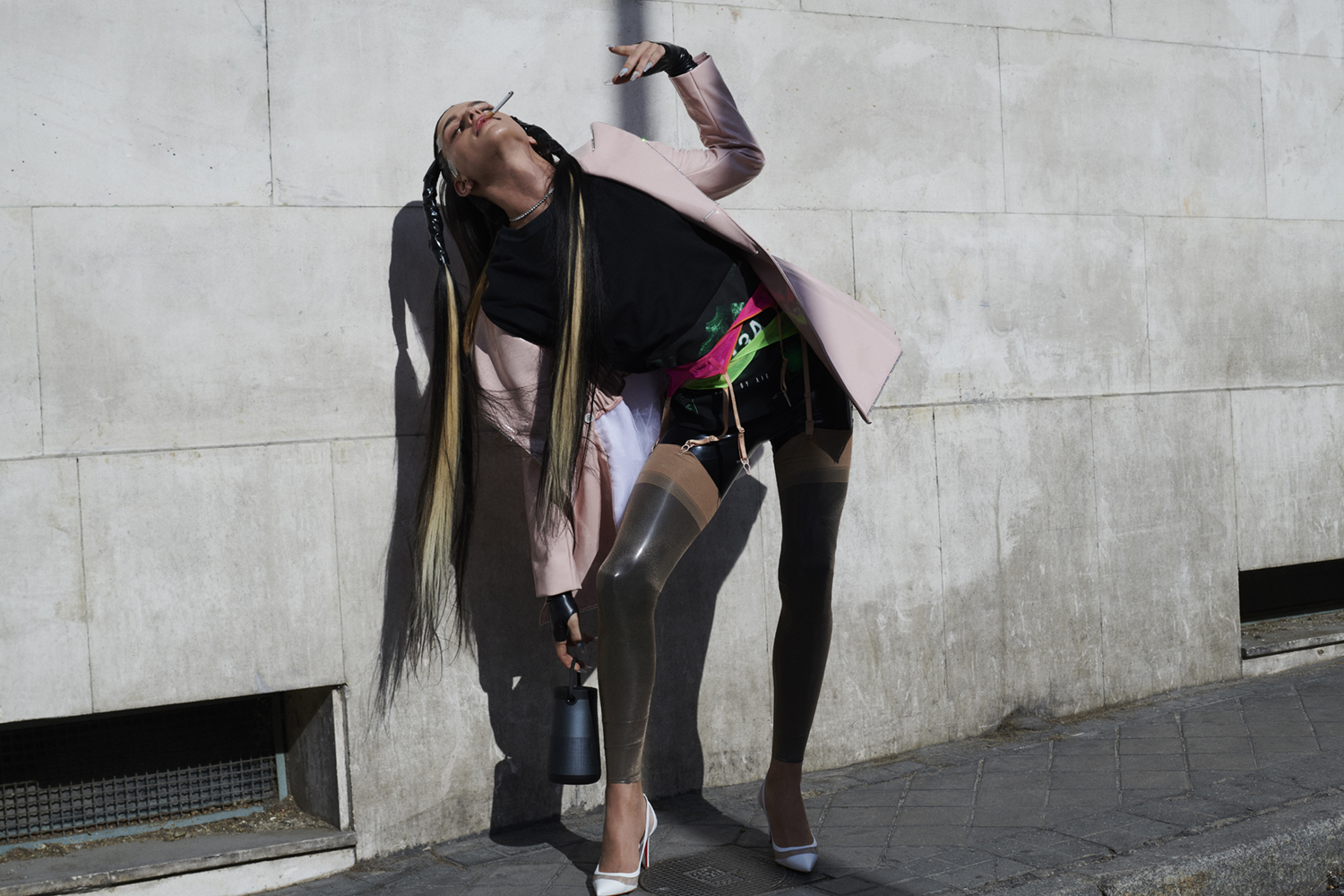
Jacket by GCDS. T-shirt courtesy of HBA Museum. Pants by Saint Laurent by Anthony Vaccarello. Gloves by Coco Latex. Garter Belts by Isosceles. Stockings by Falke. Shoes by Christian Louboutin.
ARCA: I had a dream about that once, where a part of me was so limp that it wasn’t moving. One part of me had to drag the other part around, like it was dead weight. Then I had a dream where finally I looked into that other me’s eyes with anger, trying to shake them awake. And in their eyes, there was so much sadness. I thought it was because they had given up. They were numb. But it was the opposite. It was that they had so much love in them that they didn’t even know how to move. So I embraced them.
ABRAMOVIĆ: I’m always incredibly nervous before a performance. Everything annoys me, and I get horrible cramps in my stomach. But when I step across the threshold to the stage, I go from simple me to Super Me. In front of an audience, everything disappears like magic. Another persona takes my place, and that persona can do anything because the energy of the audience gives it life.
ARCA: I relate to everything you just said. I think of it in shamanistic terms, where it’s like a spiritual technology. The thing that’s been scariest for me is that Super Me, that energy that you mentioned that’s heightened, almost has an exoskeleton where you push yourself beyond what you could do if you didn’t have the audience present. I get scared that I’m going to stay in that state. It’s happened before, where the performance stops and I can’t turn it off. It absorbed me too much.
ABRAMOVIĆ: I call this “body drama.” It’s what happened to Elvis Presley in his last concert, when his body was completely wasted, fucked-up on drugs or whatever, and he could hardly stand on the stage but then the voice came, and the voice was divine. The voice and body didn’t relate to each other. But I don’t think you have body drama. You’re far away from that.
ARCA: I study divas. All this pressure is coming toward you from the outside, and in order to not crumble under that pressure, you need to exert the same amount of pressure back, because otherwise that energy just enters you. Some divas are problematic before and after the show, but while they’re on stage, all they want to do is make people happy. Then there’s the other kind of diva, which I think I’m more like. I’m nice to everyone before and after the show, but during the show I turn into a demon.
ABRAMOVIĆ: When you are performing, do you feel like there is a guardian angel helping you get through it?
ARCA: I do. I feel it like an energy that moves through me. Kind of like a conscious surrender.
ABRAMOVIĆ: Another thing I’m fascinated about is synchronicity, those moments when everything falls into place. Maybe you have a question, and the answer is on the radio or in the shadow of the little kid crossing the street. It’s some kind of luminosity, a clarity of mind. Do you ever experience this?
ARCA: Yes. I’m a little afraid of it. Have you ever felt that there’s so much synchronicity that it can feel like paranoia or delusion? Sometimes there is so much mean- ing and symbolism moving through me that I start to forget where I end and where the world begins. When I think about synchronicity, I worry that maybe one’s agency is not driving things. What do you think about free will?
ABRAMOVIĆ: I’m not crazy about it. We’re connected with the trees and the birds and the rocks and the cosmos and the stars and the black holes and the universe and everything. We are little dots in this big puzzle. When I was a kid, I always imagined that humanity was in the heel of an old, fat lady and that she was just kicking us around.
ARCA: The one place I would argue that free will might exist is with ego. There’s an idea from Jungian analysis where you imagine that ego is like a sphincter. Waste moves through it, but it’s able to produce a lot of pleasure, too. If you give the ego too much power, then you’re a prisoner of it, but if you give the ego too little space, you also become a prisoner of it.
ABRAMOVIĆ: Our problem as human beings is that we don’t live in our bodies enough. We live in our intellect, and intellect has fucked us up in so many ways. The body has ancient wisdom. It knows everything. It’s the most extraordinary machine or computer that we have. Think about our cells and our atoms. It’s like a microcosmos. The body can heal himself. The body can do anything. But the mind overthinks, and it fucks up every time.
ARCA: If the mind is responsible for something as amazing as having the idea to come up with a performance and then doing the performance, that’s cosmic, too.
ABRAMOVIĆ: So, what do you think about sex?
ARCA: When I think about sex, the first word I want to say is “libido,” because we tend to think of libido as erotic energy, but really, it’s a life force. Imagine how it moves our bodies to touch and collide with each other and mate and breed and love and fear. Art comes from it, too. Our sex drive and creativity are birthed from it.
ABRAMOVIĆ: I agree. There’s only two times in life that the brain stops thinking: when we sneeze and when we orgasm. That’s it. Let’s talk about transitioning.
ARCA: I was trying so hard not to do it, but the image that finally reached me was of the body that I want to leave behind when I die. I support body modification in all its forms, and I like to think of transness not as a pathology, or transitioning as a response to a symptom, but rather the manifestation of an expression. It’s not about trying to fix a glitch. It’s about an expression that comes from within that you can’t shake and you don’t know why and the curiosity doesn’t disappear and it makes you unhappy not to listen to that.
ABRAMOVIĆ: This is listening to your body more than listening to your brain, because what the body needs is transformation. That’s what it’s telling you.
ARCA: You know what I see it as? It’s a static that was inside me that others didn’t realize was there. And what I did was I moved it outside. So now it can cause friction between my environment and my identity, but it feels less noisy that way than to keep it in.
ABRAMOVIĆ: What do you think about dying?
ARCA: I believe in death positivity. The more we face our fear of death, the less of a grip it has over our actions.
ABRAMOVIĆ: I think I should adopt you.
You can read Arca’s conversation with Oscar Isaac here, and with Rosalía here.
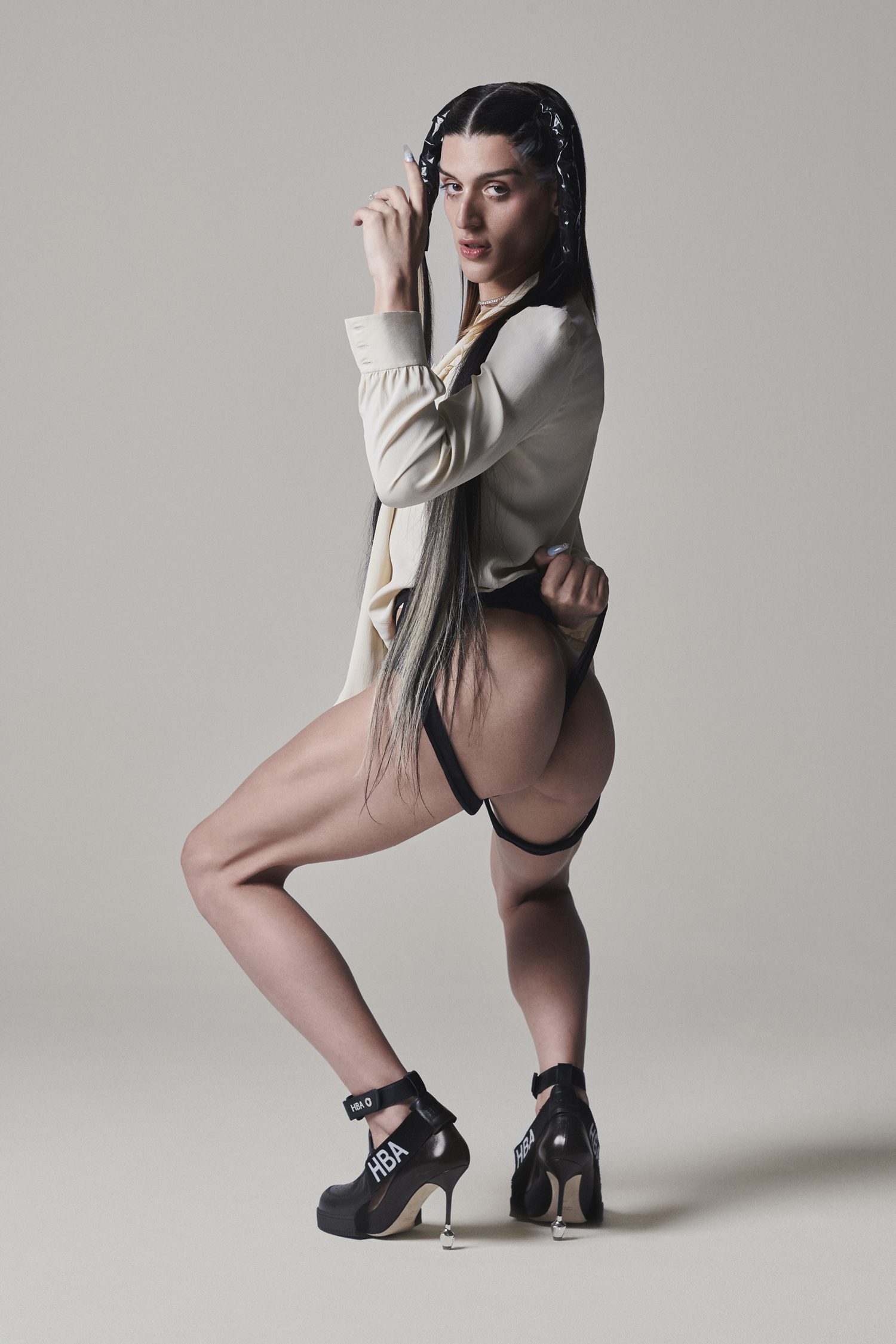
Shirt by Celine by Hedi Slimane. Briefs and Garter Belt by DSTM. Shoe Cap courtesy of HBA Museum. Shoes by 032c RTW.
This article appears in the Fall 2020 issue of Interview Magazine. Subscribe here.
———
Hair: Xavi Garcia at Salon 44
Makeup: Vincent Guijarro.
Set Design: . Cito Ballesta.
Photography Assistant: Aaron Serrano.
Fashion Assistant: Isabel Greece.
Set Design Assistant: Malva Sawada.

